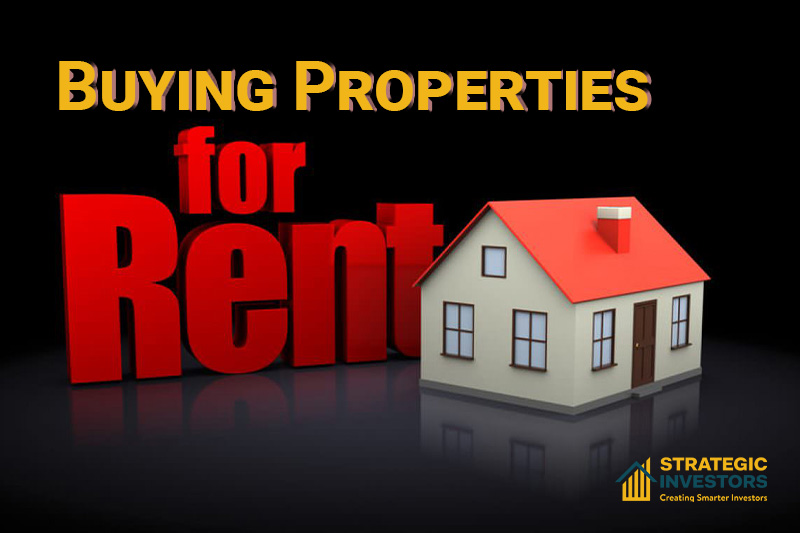
Are you considering diving into the world of rental property investment? With the potential for regular income, property appreciation, and portfolio diversification, it’s no wonder many investors are drawn to this lucrative venture. However, to ensure success in this competitive market, it’s crucial to be well-prepared and informed.
This comprehensive guide will walk you through the essential steps and considerations for buying properties to rent in 2023, from budgeting and financing to tenant selection and ongoing maintenance.
Key Takeaways
- Understand the risks and benefits of rental property investment.
- Create a budget, research location & type and compare loan terms to finance your purchase.
- Consider legal obligations & tax implications, prepare the property for rent, screen tenants and create lease agreements. Maintain regularly for successful management.
Understanding Rental Property Investment

Understanding the risks and challenges that accompany property investment is a prerequisite to reaping these benefits.
Benefits of rental property investment
Investing in rental properties offers several benefits, including:
- Generating regular annual rental income
- Potential appreciation of the property’s value (capital growth)
- Positive rental yield (income generated from tenants minus total expenses)
- Tax advantages, such as the ability to deduct expenses and potentially defer capital gains tax
These advantages make rental properties a popular investment choice for many individuals.
Remember though, investing in rental properties presents its own challenges, such as finding tenants, managing costs, and possible periods of vacancy.
Risks and challenges
Investing in rental properties comes with certain risks, such as market volatility, tenant-related issues, and potential unanticipated costs. Mitigating these risks and challenges requires resource allocation for accurate reporting, professional services, and diligent practices to prevent cutting corners.
Rental property investment comes with ongoing costs. These may include:
- Council and water rates
- Building insurance
- Landlord insurance
- Body corporate fees (if applicable)
- Land tax
- Property management fees
- Maintenance expenses
Careful consideration of management costs and other expenses and potential drawbacks can help you make informed decisions when investing in property.
Budgeting for Your Investment Property

It is important to consider all costs associated with a property purchase, especially when it comes to an investment property, including the cost of the property.
Setting a budget

Creating a budget grounded in these factors enhances your understanding of cash flow and informs your decisions when buying an investment property.
Accessing equity
Equity, the difference between the current property value and the amount owed on it, can be leveraged to borrow against investment property. Accessing equity from existing properties provides a potential means to finance your investment property, sparing your current savings and other investments.
This can provide a financial cushion, allowing you to focus on the other aspects of managing and maintaining your rental property.

Researching Location and Property Type

- Choose a desirable location that will attract tenants.
- Consider the target tenant demographics and choose a property type that caters to their needs.
- Evaluate the rental yield potential of the property.
By considering these factors, you can make an informed decision and maximize your rental property investment.
Choosing the right location
Consider factors like local amenities, transportation, and potential growth when selecting a location for your rental property. Some key considerations include:
- Proximity to essential amenities like transportation, stores, universities, and schools
- Availability of public transportation options
- Potential for future growth and development in the area
Choosing a location that meets these criteria will increase the likelihood of attracting tenants and maintaining a steady rental demand.
Researching the property market, demographics of the suburb, and recent sales history in the area will further assist you in making an informed decision.
Selecting the best property type
Evaluate property types based on the target tenant demographics and rental yield potential. For example, a family-oriented suburb might be better suited for a spacious house, while a bustling urban area might attract more interest in apartments or studios.
Selecting the right property type boosts the likelihood of attracting high-quality tenants and maximizing your rental income.
Financing Your Rental Property

Loan types
Different loan types, such as:
- Fixed-rate loans: offer a stable interest rate over the loan term, resulting in consistent monthly payments
- Variable-rate loans: have fluctuating interest rates that may affect your monthly payments
- Interest-only loans: allow you to only pay the interest on the loan for a certain period of time
These loan types cater to different investment strategies.
Interest-only loans allow you to repay only the interest on the loan for a specified period, with the principal balance due at the end of the loan term. Select a loan type with your investment strategy and cash flow requirements in mind.
Interest rates
In financing your rental property, it’s wise to compare interest rates and terms from various lenders to secure the best deal. Factors to consider when evaluating interest rates include the loan amount, type of loan, and your credit score.
Additionally, compare associated fees, such as origination fees, closing costs, and other fees, to ensure you are getting the most advantageous terms from your lender.
Legal Obligations and Tax Implications

- Expense deductions
- Rental income taxation
- Landlord responsibilities
- Capital gains tax
- Negative gearing
Familiarizing yourself with these obligations and implications will ensure you are well-prepared for the responsibilities of being a landlord.
Landlord responsibilities
As a landlord, it’s critical to comprehend your responsibilities, though they may differ from state to state or country to country. These responsibilities often include:
- Collecting rent in a timely manner
- Providing receipts
- Enforcing late fees
- Maintaining the property
- Ensuring the property is kept clean and safe.
Additionally, you need to be aware of and comply with local, state, and federal laws, as well as any applicable landlord-tenant laws.
Tax considerations
Rental property owners are eligible for tax deductions on expenses incurred related to the property while it is being rented out or available for rent. Moreover, if your property is negatively geared, meaning the deductible expenses exceed the rental income, you can use this loss to reduce your overall taxable income.
Bear in mind that you may need to pay capital gains tax when you sell your investment property and realize a profit. Consulting with a tax professional is prudent to ensure comprehension of tax implications and maximize any relevant tax benefits.
Property Management Options

It may be beneficial to consider speaking with a property investment strategist if you are a first-time investor. A property investment strategist can provide insight into the best rental property management options for your portfolio, and they will help ensure that the returns on your investments meet or exceed your expectations.
Once you have made the decision to outsource the rental property management to a property management company, you should do your research in order to determine the best fit for your needs. It is important to look into the policies of the company and make sure that they are in line with your expectations. Additionally, ensure that any potential property management companies have experience working with rental properties and can provide references from other customers.
It is also essential to make sure that the property management company is properly insured and bonded. This will help protect you, the investor, if any issues arise with the rental property or its tenants.
Overall, finding a reliable property management company will help take some of the stress out of owning a rental property and allow you to focus on other aspects of your investment portfolio. Doing research into different companies and talking to a property investment strategist can help you make an informed decision about who should manage your rental property.
Additionally, it is important for investors to remember the importance of proper maintenance and upkeep of rental properties. Neglecting this aspect can lead to added costs, tenant dissatisfaction, and more financial losses than necessary. Regularly scheduling inspections can help ensure that the rental property is in good condition, and this can be managed through the property management company or a trusted contractor.
By taking these steps to evaluate potential property management companies and staying on top of maintenance, you can enjoy the benefits of owning a rental property with minimal hassle. With proper planning, an investor can manage their rental properties efficiently for maximum return on investment.
Hiring a property manager
Hiring a property manager can save you time and energy by handling tenant relations and maintenance tasks on your behalf. A property manager can assist with the recruitment, screening, and placement of tenants in your investment property, ensuring you attract quality tenants and maximize rental income.
However, property managers typically charge a fee, which can range from 7% to 10% of your total rental income each week. Before deciding, weigh the benefits of hiring a property manager against the associated costs.
Finding a reliable property manager
If you decide to hire a property manager, it’s important to research and interview potential candidates to find a reliable and experienced professional. When assessing potential property managers, examine their background, references, fees, and services.
Choosing a reliable property manager can help secure consistent revenue, optimal capital growth, and maximum returns on your investment.
Preparing Your Property for Rent

This will not only help you secure a steady stream of rental income but also maintain the value of your investment property over time.
Repairs and upgrades
Before renting out your property, address any maintenance issues and consider upgrades to enhance the property’s appeal and rental value. This may include repairs such as fixing dysfunctional fixtures, plumbing leaks, or electrical problems, as well as strategic upgrades like replacing aged window coverings, updating appliances, or enhancing the overall aesthetics of the property.
Striking a balance between necessary repairs and strategic upgrades is key in enticing tenants and maximizing rental income.
Marketing your property
Effective marketing of your property is vital for attracting tenants and maximizing rental income. Utilize various channels, such as online listings, local advertisements, and even word of mouth, to reach potential tenants and showcase your property’s features and amenities.
Additionally, ensure your property is presentable and well-maintained, as this will not only help attract tenants, but also maintain the value of your investment property over time.
Tenant Selection and Lease Agreements

Screening tenants
Screening potential candidates through background checks, credit reports, and references is crucial to ensure you attract reliable and responsible tenants. This includes verifying their income, employment, and rental history, as well as contacting references provided by the applicant to gain insight into their character and reliability.
Thoroughly screening potential tenants can help minimize the risk of rental arrears, property damage, and disputes.
Lease agreements
Crafting a comprehensive lease agreement is vital to outline the terms, responsibilities, and expectations for both the landlord and tenant. A well-drafted lease agreement should include:
- The rental amount
- Duration of the lease
- Security deposit
- A clear outline of both the tenant’s and landlord’s rights and obligations
Having a legally binding lease agreement in place safeguards both parties in case of disputes and ensures smooth and successful rental property management.
Ongoing Rental Property Maintenance

Routine maintenance tasks should be done on a regular basis, such as checking smoke detectors.
Routine maintenance
Ensuring your property remains in optimal condition requires regular inspections and maintenance, which can help identify and promptly address any potential issues. Routine tasks may include inspecting the property for damage, verifying smoke alarms are in working order, and ensuring the property is clean and presentable.
By scheduling regular maintenance, you can preserve the value of your property and minimize the likelihood of costly repairs in the future.
Handling emergencies
Preparedness for handling emergency repairs and issues promptly is crucial for landlords to maintain tenant satisfaction and avoid potential legal consequences. This may include addressing plumbing or electrical issues, pest infestations, or tenant complaints.
Responding quickly to emergencies not only keeps your tenants happy, but also helps protect your investment property from further damage.
Summary
Investing in rental properties can be a rewarding and profitable venture when approached with knowledge, planning, and diligence. By understanding the benefits and risks, budgeting appropriately, researching location and property type, securing financing, navigating legal obligations and tax implications, managing the property effectively, and maintaining ongoing maintenance, you can maximize your rental income and achieve long-term success in the rental property market.
So, are you ready to embark on your rental property investment journey? With the insights and strategies provided in this comprehensive guide, you’re well-equipped to make informed decisions and build a successful rental property portfolio that can provide lasting financial rewards.
Frequently Asked Questions

How much deposit do I need for investment property?
You’ll need to put down a 20% deposit for an investment property, typically sourced from your savings or equity from your current home.
What are the disadvantages of buying a rental property?
Buying a rental property can be expensive due to high entry costs and ongoing expenses. Furthermore, the investment is generally illiquid and properties may not increase in value.
Tenant troubles can also add extra stress to owning an investment property.
Is property a high risk investment?
Property investments can be high-risk, as they can be vulnerable to damage and require market analysis to minimise losses.
However, these risks can be managed by understanding the real estate landscape and taking precautions against potential damages.
Can I buy investment property with 5% deposit?
Generally, lenders require an investor to demonstrate a 5-10% deposit when taking out an investment loan.
It’s recommended for investors to consult a mortgage broker when comparing home loan options.
What are the benefits of investing in rental properties?
Investing in rental properties offers a reliable source of income, potential for asset appreciation, and an opportunity to diversify your investment portfolio.











